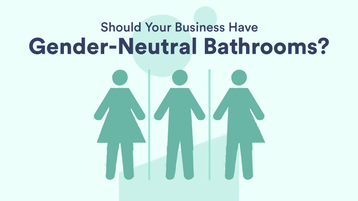
Discussions about gender-neutral bathrooms are starting to come forward, and many small and medium-sized businesses (SMBs) wonder if this could be a step to create a more inclusive and welcoming work environment. The topic of gender-neutral bathroom facilities for staff members and customers may not be an issue for some small businesses. For example, if your business has only one shared facility on the premises. For small business owners (SBOs) who rent, either in an office building or stand-alone space, the building owner would carry the cost and logistics of making such a change. But property owners have more leeway, and they should have a discussion in earnest to determine whether and if they can the change.
Are there benefits to gender-neutral bathrooms?
At first blush, the prospect of gender-neutral bathrooms may seem like a cost-only proposition. New construction and plumbing costs can be high. But there may be benefits that outweigh cost, and SMBs should factor them into their decision. These may make the price of retrofitting or revamping existing spaces worth the investment.
Walking the talk
If your organization promotes inclusivity and diversity, investing in gender-neutral facilities illustrates your commitment. When your mission statement explicitly outlines inclusivity, but your location doesn’t support providing a comfortable space for workers and customers, the message may ring hollow. Gender-neutral bathrooms validate the dignity and rights of everyone who uses them.
Attracting and retaining talent
As you look to hire new talent, tours of your facilities may tip the balance in your favor when candidates see your commitment to inclusion and diversity. A recent survey revealed over 86% of candidates say workplace diversity is an important factor in their decision to accept a new position. For Millennials in the workplace, the same survey found they stayed at their company twice as long if it fostered equity, diversity, and inclusion. Many companies can recover facility upgrade expenses through a decrease in recruitment and training costs.
A recent survey revealed over 86% of candidates say workplace diversity is an important factor in their decision to accept a new position.
Customer comfort
For companies that have bathroom access open to the public, your commitment to inclusivity is demonstrated every time a customer uses them. Just as many restaurants and chains added “family-friendly” restrooms in the past, with larger facilities and changing tables, the response from the public was positive. A gender-neutral facility will likely elicit the same positive response.
Regulatory requirements
To date, few states or localities have mandated companies install gender-neutral bathrooms. Illinois legislators signed a bill in 2019 requiring all single-stalled facilities be labeled gender-neutral. The ACLU reported several cities, including Austin, New York City, and Philadelphia, also require single-stall public restrooms be labeled “all-gender.” The recent Supreme Court decision that validates transgender rights in the workplace could be a tipping point for regulators to assure physical spaces, including bathrooms, are more inclusive moving forward.
The logistics
Where possible, the addition of single-use, gender-neutral spaces is the best option.
Cost is a factor when determining whether to upgrade existing facilities or install a new one. For many organizations, limited space may be a determining factor. Where possible, the addition of single-use, gender-neutral spaces is the best option. In some cases, these may reduce the size of adjoining gender-specific facilities to a small degree, but they offer an option for employees and customers to make the selection most comfortable to them. Another option may be to remove urinals and make all multi-use restroom facilities gender-neutral. For businesses that have installed or upgraded facilities for people with disabilities, relabeling these as gender-neutral and wheelchair accessible could be a solution. Other companies have kept existing facilities but changed signage to read “gender neutral with urinals” and “gender neutral with cubicles.” For these, the subtle change isn’t all that’s required. Gender-neutral facilities that include urinals should still provide sanitary products and disposal methods commonly found in traditionally female-use restrooms. All facilities should have proper maintenance for sanitation and have working locks on stall doors.
For renters
For businesses that don’t own their space, the challenge may be to work with landlords to make any upgrades or changes. Business owners who work in shared office spaces in larger buildings may want to corral their fellow renters to make the suggestion to property managers. For single-space renters, working with your landlord may be challenging, but could reap benefits in the long term.
Inclusivity matters
“Regardless of the physical layout of a worksite, all employers need to find solutions that are safe and convenient and respect transgender employees.”
If renovation or construction isn’t feasible, employers can still make accommodations that help employees and customers feel more welcome. Recent guidance from the Occupational Safety and Health Administration (OSHA) outlines best practices employers should adopt to provide restroom access for transgender users specifically. These include:
- Allowing transgender users to utilize the facilities that conform to their gender identity
- Offering single-occupancy gender-neutral locations
- Providing multiple-user, gender-neutral facilities with lockable single occupant stalls
The guidance writes, “Regardless of the physical layout of a worksite, all employers need to find solutions that are safe and convenient and respect transgender employees.” Organizations that provide a welcoming environment to their workers and clients should reap the benefits these small or larger changes make. A commitment to inclusivity must assure that physical spaces demonstrate company values and goals.
This communication is for informational purposes only; it is not legal, tax or accounting advice; and is not an offer to sell, buy or procure insurance.
This post may contain hyperlinks to websites operated by parties other than TriNet. Such hyperlinks are provided for reference only. TriNet does not control such web sites and is not responsible for their content. Inclusion of such hyperlinks on TriNet.com does not necessarily imply any endorsement of the material on such websites or association with their operators.





